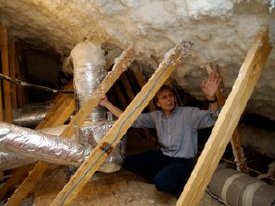Nov 26 2009
Oak Ridge National Laboratory has announced plans to conduct a series of deep energy retrofit research projects with the potential to improve the energy efficiency in selected homes by as much as 30 to 50 percent.
 ORNL’s Jeff Christian points out the insulating foam used to seal the attic in a deep retrofit house.
ORNL’s Jeff Christian points out the insulating foam used to seal the attic in a deep retrofit house.
The projects will be supported by up to $1.4 million from the Department of Energy's Building America Program, which has received additional funding from the American Recovery and Reinvestment Act.
Deep energy retrofits are renovations to existing structures that use the latest in energy-efficient materials and technologies and result in significant energy reductions. Jeff Christian, the ORNL buildings technologies researcher heading the project, said at least 10 homes across the region will be sought to participate. The home selection process is yet to be finalized, and homeowners will have to pay most of the costs-about $10 per square foot of living space-and agree to allow their post-retrofit energy consumption to be monitored. But Christian said costs can be recovered in as little as 10 years, and energy bills potentially can be cut in half. Most important, data from the project can provide huge incentives for more deep retrofits across the region, he said.
"Deep retrofit is a fairly expensive upfront proposition, but can be one of the best investments available to many homeowners," said Christian, who also is a board member of the East Tennessee Quality Growth Council, which is helping lead the project. "We're targeting homes that are 15-35 years old-homes that are ready for new windows, heating and cooling units, appliances and maybe even solar panels to push their homes closer to near-zero energy consumption. Then we want to monitor these homes, analyze their energy consumption and celebrate the progressive vision of this region."
Christian said large efficiency gains via retrofitting were proven feasible on a test house in Knoxville last year. ORNL continues to collaborate with the Tennessee Valley Authority to better quantify the impact of deep retrofits at the Campbell Creek Energy Efficient Homes Research Project. The retrofits are part of an energy-efficient systems approach that involves making the building more air-tight; weatherizing the attic, crawl space and windows; upgrading heating and cooling units, water heaters, appliances and lighting; and installing solar panels.
"We're trying to look at what we can do with existing housing stock to improve the efficiency and also how we can influence new construction," said TVA researcher Bruce Rogers. "The deep retrofit project will enhance our research findings with results from additional homes in the Valley."
Christian explained many new two-story houses have a heat pump for downstairs and another in the attic for upstairs. Much of the cost of cooling conventional houses comes from the unit in the hot attic operating very inefficiently. In a retrofit house, insulation is removed from the attic floor. The roof and sides of the attic are sealed with insulating foam, and a high-efficiency heat pump is installed in the attic. The result: huge energy savings in heating and cooling because the entire HVAC system is inside the insulation layer.
Also, the system provides thermostats on both floors, but instead of operating two separate heat pumps, a single smarter unit directs heating or cooling where it's needed.
Christian said results of all of the retrofits will be available online, showing detailed data on the costs and benefits of the retrofits.
"This project connects our research to the surrounding community," Christian said. "We're hoping that this demonstration stimulates enough interest among members of the public that it will become self-sustaining-growing the number of houses with deep retrofits."